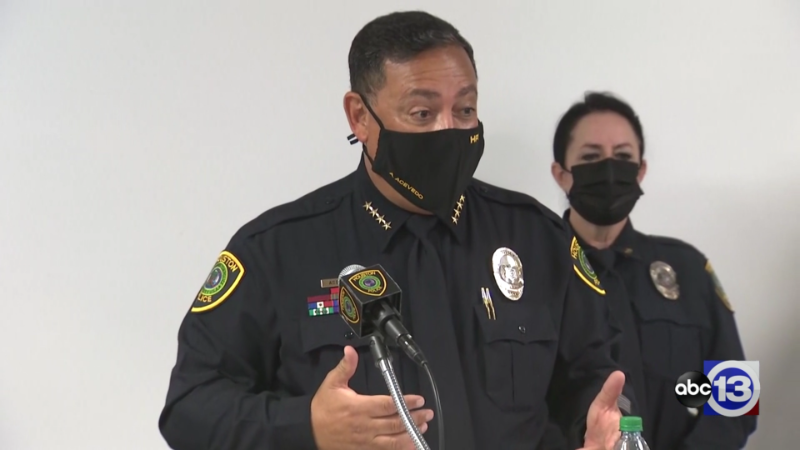In a Friday press conference, Houston Police Department Chief Art Acevedo addressed the increase in local homicides since this time last year, and attempted to shift blame for the rising number of unsolved murders by HPD over the past several years onto the Harris County court system, which he claimed is letting too many potentially violent offenders back onto the streets.
Acevedo said that the number of murders in Houston is already up “about 44 percent year-to-date,” which he blamed on increases in gang and drug related killings and the stresses of the pandemic making locals more likely to resort to violent crime.
Andy Kahan, Director of Victim Services at Crime Stoppers of Houston, joined Acevedo to call out the Harris County courts for allegedly letting too many people walk free after being charged with a crime, which he contends is contributing to the uptick in local murders.
“We are in the midst of what I’ve been calling a Harris County bond pandemic,” Kahan said, claiming that 41 murders have been committed this year by county residents who had been previously charged with a crime other than murder and had been released on bond.
“What we are seeing and what we’re trying to get people to talk about is the revolving door at the courthouse that continues to release offenders time and time again,” said Kahan.
Friday’s press conference came on the heels of a Thursday report by the Houston Chronicle’s St. John Barned-Smith that cited an internal audit into HPD’s homicide division that showed the department’s murder clearance rate had fallen from a ten-year high of 89.39 percent in 2011 all the way to 56.58 percent in 2019. The private audit also showed that the murder solve rate for 2020 from January 1 through May 6 was 48.28 percent.
Acevedo referenced Kahan’s accusation that the county courts had become a revolving door for criminals, and said that he believes part of why HPD is having so much more trouble solving murders in recent years is because the public may be less willing to cooperate with police because they may not think it’ll accomplish anything if the courts will just end up letting suspects out on the streets again.
“How likely are people to cooperate in an environment where it’s a cyclical door?” Acevedo said. “And let me just be real clear: we’ve got a [state] legislative session coming up, and one of the highest priorities of law enforcement is bond reform… I don’t care about cash bond stuff, that’s not my bailiwick, but we need to have a tool that is a risk-based tool and make decisions on bond based on behavior and risk.”
He also went off on a tangent about how local news outlets don’t publish photos of men caught soliciting prostitutes anymore, and tried to tie that in with his and Kahan’s criticism of the county courts to make the point that so-called “progressives” who support criminal justice reform and the local media at large aren’t thinking enough about crime victims.
“We’re living in a time where it seems like people are more interested in the bad people and their rights and not in the victims’,” Acevedo said. “ I mean, that’s the elephant in the room, right? We’re upside down in this country right now. Criminal justice reform needs to start with the victims.
“I became a cop to keep people safe, not to have murder suspects going in one door and out the other, and then having the media do a story, St. John there, about how homicides are up with no mention about the rest of the criminal justice system.”
Acevedo also cited budget concerns and a lack of overtime funding for the falling rate of murders being solved by HPD before thanking Houston Mayor Sylvester Turner and City Council for a recent $4 million-plus investment of federal coronavirus response funds into the department.
When asked about HPD’s low murder clearance rate, Acevedo tried to pin the blame on the coronavirus. “This year’s an anomaly of a year,” he said, “ but you can’t make conclusions based on one year of data,” despite the fact that the fall-off in the local solved murder rate had already fallen significantly in the years leading up to the pandemic.
“There’s ebbs and flows. This is one year. We’re confident that as we continue to build the expertise of our homicide division — and we’ve got a lot of young and enthusiastic men and women in there — and continue to invest in the additional resources, we will come out stronger next year,” Acevedo said.
Support Us
Houston's independent source of
local news and culture
account
- Welcome,
Insider - Login
- My Account
- My Newsletters
- Contribute
- Contact Us
Acevedo and Crime Stoppers Blame Low Murder Solve Rate On Bond Releases and Coronavirus

Screenshot
HPD Chief Art Acevedo said on Friday people shouldn't blame his department for the falling rate of murders solved in recent years.
[
{
"name": "Related Stories / Support Us Combo",
"component": "11591218",
"insertPoint": "4",
"requiredCountToDisplay": "4"
},{
"name": "Air - Billboard - Inline Content",
"component": "11591214",
"insertPoint": "2/3",
"requiredCountToDisplay": "7"
},{
"name": "R1 - Beta - Mobile Only",
"component": "12287027",
"insertPoint": "8",
"requiredCountToDisplay": "8"
},{
"name": "Air - MediumRectangle - Inline Content - Mobile Display Size 2",
"component": "11591215",
"insertPoint": "12",
"requiredCountToDisplay": "12"
},{
"name": "Air - MediumRectangle - Inline Content - Mobile Display Size 2",
"component": "11591215",
"insertPoint": "4th",
"startingPoint": "16",
"requiredCountToDisplay": "12"
}
,{
"name": "RevContent - In Article",
"component": "12527128",
"insertPoint": "3/5",
"requiredCountToDisplay": "5"
}
]

